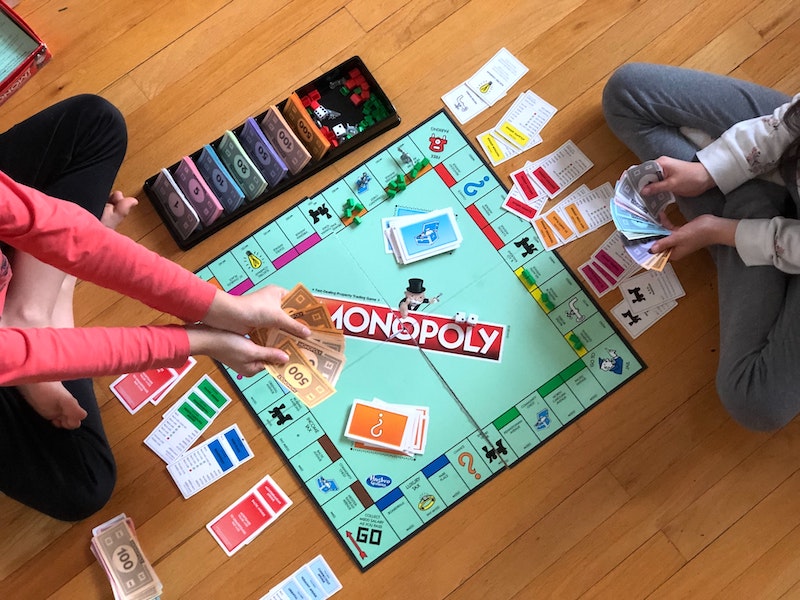Board Games Educating People about Poverty and Inequality

Historically, many board game ideas come from an idea about social or moral issues. For example, Monopoly was designed to teach people about financial difficulties such as finding affordable rent and paying taxes. Board games also help people develop real-work skills such as creativity, the ability to plan and prepare and empathy. Board games can even teach social activism. By overcoming adversity in board games such as Peacemaker, players grab hold of newfound mental tools that help them achieve success for their own causes. One truly noteworthy cause that some board games focus on is global poverty.
Across the World
Poverty is defined as living on less than $1.90 a day. The United States falls in the lower quarter of countries in terms of its poverty level. Most of the countries in the top quarter having the highest poverty levels have percentages in poverty that are more than 50%. South Sudan has the highest poverty level of 82.3% with Equatorial Guinea following close behind.
The highest poverty levels are located in Africa. For example, sub-Saharan Africa is the poorest region in the world. Of the 430 million people living there, 40% are recorded as living in extreme poverty as of 2018. Countries with the resources to help others have come together to form organizations such as the United Nations, World Bank and the European Nations to help these people in need.
Playing a board game helps people develop the skills and empathetic mindset to support organizations that are already addressing these issues. There are several examples of board games that even go as far as to address global poverty and social inequality specifically.
Development Monopoly
Multiple versions of Monopoly have undergone development. Development Monopoly is one version that focuses on raising awareness of poverty levels and inequality in developing countries. The board game revolves around the idea that not all individuals are born with the same privileges and opportunities. Players must negotiate and compromise depending upon their socio-economic group.
In original studies at universities in Belgium, students from different nationalities such as European, Asian and Latin American had the assignment of developing rules for Monopoly based on developing countries. Each time a new game began, the rules changed. In the second game, the players designed the rules around wealthier countries. The diversity of the nationalities involved forced the students to learn more about their fellow players and the poverty issues facing their homelands.
Players received salaries as a percentage. For example, a rich player may receive an 80% higher salary than a poor player. The advantages given to the rich and middle class allowed them to dominate and control the poor. The board game revealed that the rich players did not seem to mind taking advantage of the poor. After the games were completed, students were then asked how the rules of the game could be made to be pro-poor.
The Perspectivity Challenge
The Perspectivity Collective has also launched multiple poverty-related games. Notably, the Perspectivity Collective is a partnership of a dozen professionals who have lived and worked in areas such as Europe, the Middle East, Africa and more with polarized groups. The Collective’s goal is to foster social innovation and teach people how to navigate the difficulties and complexities of life.
One solution it developed is called the Perspectivity Challenge. The players play on one board that represents the world and navigate the game based on various challenges. These challenges focus on issues related to climate, food, human security, decision-making and more. The Food Challenge focuses on malnutrition and food availability and affordability, which are poverty related to the issue of global poverty. The goal of The Food Challenge is to develop and manage a country that can feed an entire population. Each player represents a different country and all must work together in order to prevent starvation.
This board game addresses the poverty issues of starvation, malnutrition and being able to feed one’s family. Players learn about the importance of world collaboration. It takes every country being invested in ending world hunger to be successful. This game is offered in multiple languages and has been played all around the world in countries such as the Netherlands, the United Kingdom, the United States, China, Cambodia, Vietnam, Thailand, India, Singapore and Manila. People at the World Bank in Washington even played it to help leaders learn collaboration and planning skills.
Ending Global Poverty
While amidst a continuing fear of the recent pandemic and a newfound necessity to find fun ways to entertain at home, a board game is a great way to educate people about the issue of poverty. Board games will always appeal to large masses of all kinds of people across the globe and can be used to reignite empathy for those around us who are struggling.
– Tara Boehringer
Photo: Unsplash
